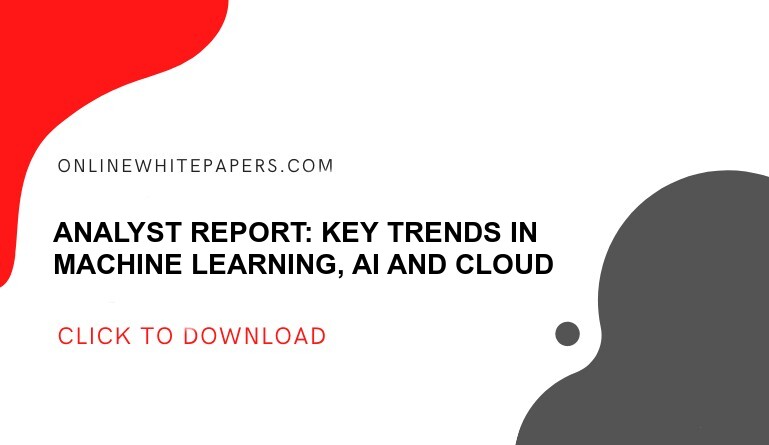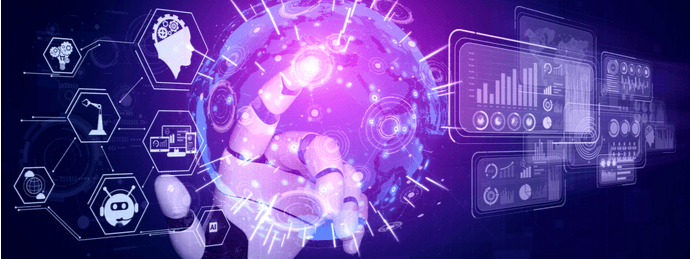Until recently, artificial intelligence seemed like something only science fiction writers could imagine. In the meantime, AI was invented in 1955, and it has since become increasingly common. AI is everywhere, from Netflix’s recommendation algorithm to pocket-assistants like Siri – even if they don’t look like robots.
Marketers are particularly enamored with Artificial Intelligence. It is a common misconception among many marketers and agencies that expanding their digital reach will increase customer conversion.
It has become part of the product strategy, the collection and analysis of consumer data, and improving future products that Artificial Intelligence (AI) plays a central role in. Successful marketing campaigns are executed using AI every day.
An intelligent machine works and behaves like a human using computer languages and algorithms. Computers with AI capabilities are capable of:
- Learning
- Planning
- Solving problems
- Recognizing speech
Machines that are capable of recognizing, predicting, learning, and reasoning are at the core of artificial intelligence. Because AI never gets tired, it can work for extended periods without a break.

Top 5 AI Applications Marketers can Use in 2021
1. Voice search and voice recognition
Since the turn of the century, speech recognition has been stagnant. Since Siri, Alexa, and other speech-enabled devices became available, vocabularies have been expanded, natural language has been introduced, and response quality has improved dramatically. At present, voice recognition restricts users to GPS maps and other hands-free methods, rather than using Google Search and Amazon Echo.
Getting more voice inquiries for your brand can be accomplished by:
- Using a conversational tone
- Adding long-tail keywords
- Using question-and-answer and short response article formats
- Using appropriate schema markup
Make your software or products more functional by including speech recognition. It will be convenient for your clients and prospects.
2. Content creation and experience personalization
Applications exist today that can transform specific information sets and data into content that seems to be authored by a living, breathing human. Automating the personalization of customer journeys using machine-generated content is increasing in popularity.
Though AI is expected to aid in content creation, human marketing will still be required for the most part. Editorial content must be created, the right imagery must be chosen to deliver the message, and display ads must pair a good image with the right message. Data insights and analytics will enable marketers to better plan and personalize smart content creation, cut production time, and save money in the short term.
The algorithms learned from analyzing more data than a human could ever think to examine, enabling them to serve customers better during critical decision-making moments. A recommendation based on a set of predetermined rules programmed in at the outset is nowhere near what these technologies are capable of. Nowadays, recommendation engines evaluate myriad data points culled from a wide variety of sources.
3. Image recognition and visual search
Recent developments in artificial intelligence are making it possible to achieve remarkable things with visual search.
The tech is still relatively young, however, and using platforms such as Pinterest and Google Lens is enabling visual searches to become more common. As with traditional text-based searching, the visual search looks for results that have similar visual appearances to each other.
The use of visual search in marketing and retail has several advantages. The system can improve merchandising and personalize shopping.
Visual search technology can suggest related products based on the way they look, instead of recommending products based on a shopper’s past purchases. By doing so, it helps customers find items that complement one another.
4. Better user experience
Effective marketing measures are based on enhancing the user experience. Customers want an excellent customer experience from start to finish when it comes to collaboration.
With the help of AI, marketers can design and customize marketing campaigns uniquely tailored to each user, resulting in predictable outcomes.
Customized AI solutions and messages are primarily focused on where and what customers are doing right now. So, they will be able to resolve the problem at hand.
Consumers browse websites because of a good user experience. They are more likely to convert if they devote more time to it. The use of automation and AI for UX design can result in websites that optimize themselves automatically. As a result, the users will enjoy a more enjoyable experience from beginning to end.
5. Content creation powered by AI
It has enormous potential for improving the productivity of content creators. According to Gartner, 20 percent of business content will be authored by machines by 2018.
Automated content is currently created using simple rules and formats, such as:
- Loss and profit summaries
- Statistical reports every quarter
- Descriptions of hotels
- Stock insights in real-time
- Recaps of sports games
The artificial intelligence-generated narratives are designed to sound as if they were written by humans. Your brand’s rules and formats determine each narrative’s data insights and writing style.
Final Thought
Marketing intelligence has been transformed by AI as it provides marketers with data and ideas that have improved their profits and competitiveness in the market. If used wisely, artificial intelligence can transform our economy. The impact of AI on every industry will be certain once it is equipped with the right skills, planning, and experimentation. To learn more about how B2B marketers can implement AI into their marketing strategies, connect with the team at Byonic.AI.

